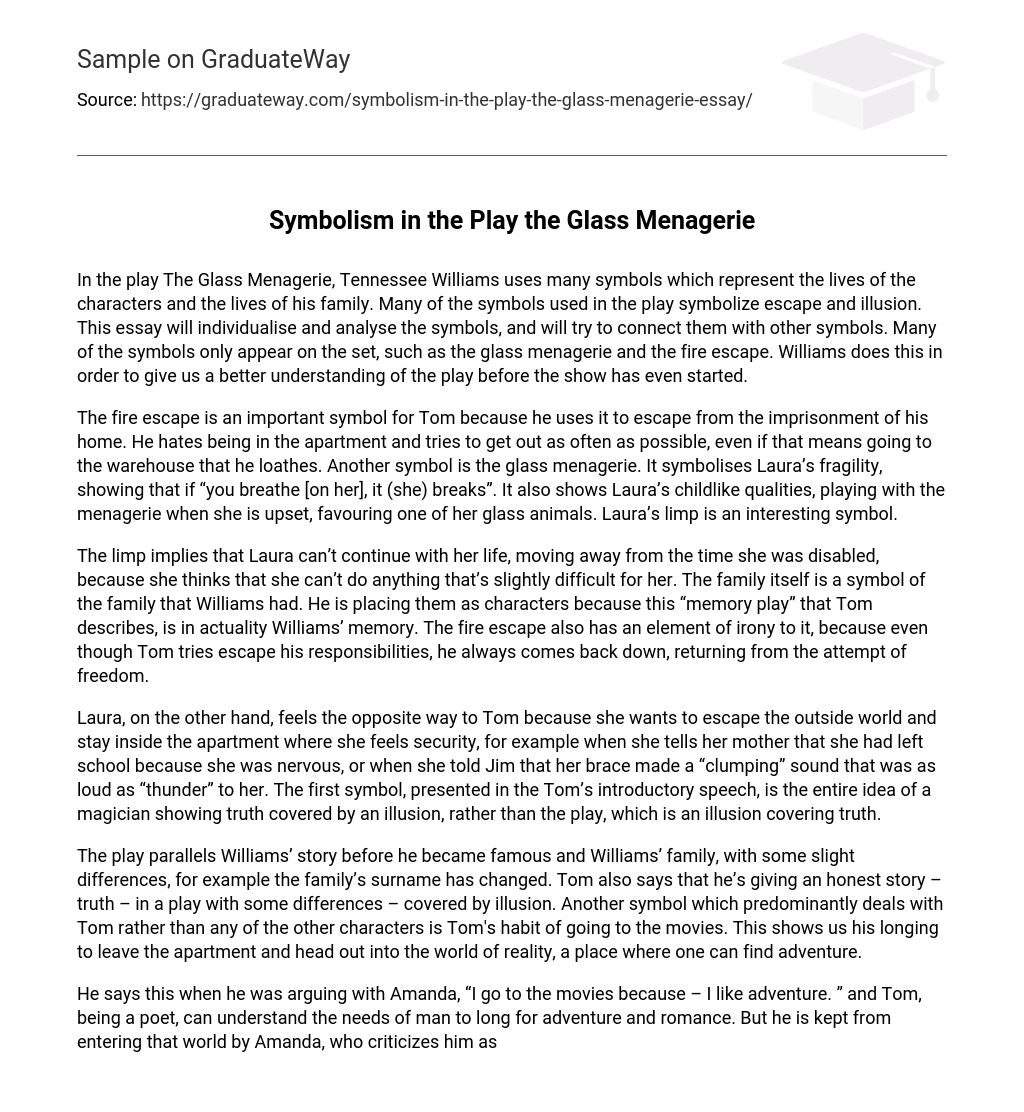In the play The Glass Menagerie, Tennessee Williams uses many symbols which represent the lives of the characters and the lives of his family. Many of the symbols used in the play symbolize escape and illusion. This essay will individualise and analyse the symbols, and will try to connect them with other symbols. Many of the symbols only appear on the set, such as the glass menagerie and the fire escape. Williams does this in order to give us a better understanding of the play before the show has even started.
The fire escape is an important symbol for Tom because he uses it to escape from the imprisonment of his home. He hates being in the apartment and tries to get out as often as possible, even if that means going to the warehouse that he loathes. Another symbol is the glass menagerie. It symbolises Laura’s fragility, showing that if “you breathe [on her], it (she) breaks”. It also shows Laura’s childlike qualities, playing with the menagerie when she is upset, favouring one of her glass animals. Laura’s limp is an interesting symbol.
The limp implies that Laura can’t continue with her life, moving away from the time she was disabled, because she thinks that she can’t do anything that’s slightly difficult for her. The family itself is a symbol of the family that Williams had. He is placing them as characters because this “memory play” that Tom describes, is in actuality Williams’ memory. The fire escape also has an element of irony to it, because even though Tom tries escape his responsibilities, he always comes back down, returning from the attempt of freedom.
Laura, on the other hand, feels the opposite way to Tom because she wants to escape the outside world and stay inside the apartment where she feels security, for example when she tells her mother that she had left school because she was nervous, or when she told Jim that her brace made a “clumping” sound that was as loud as “thunder” to her. The first symbol, presented in the Tom’s introductory speech, is the entire idea of a magician showing truth covered by an illusion, rather than the play, which is an illusion covering truth.
The play parallels Williams’ story before he became famous and Williams’ family, with some slight differences, for example the family’s surname has changed. Tom also says that he’s giving an honest story – truth – in a play with some differences – covered by illusion. Another symbol which predominantly deals with Tom rather than any of the other characters is Tom’s habit of going to the movies. This shows us his longing to leave the apartment and head out into the world of reality, a place where one can find adventure.
He says this when he was arguing with Amanda, “I go to the movies because – I like adventure. ” and Tom, being a poet, can understand the needs of man to long for adventure and romance. But he is kept from entering that world by Amanda, who criticizes him as being a “selfish dreamer. ” However, Tom has made steps to escape into reality by transferring the payment of a light bill to pay for his dues in the Merchant Seaman’s Union. When Tom comes back from the cinema, drunk, he talks of a magician (a continuation of Tom’s description of the play).
The magician performed a trick which involved him escaping from a coffin that was nailed shut, without removing a nail. This is a plainly obvious symbol for what Tom wants to, and will, do. He wants to leave the world he lives, being nailed down by the responsibilities of his family – the coffin – without moving a nail. He praises the magician, “There is a trick that would come in handy for me – getting me out of this… situation… ” He is saying that he just wants to go up the fire escape one day and never come down again, which he does in the end.
Another symbol, which deals with both Amanda and Laura, is Jim O’Connor, Tom’s friend. To Laura, Jim represents the one thing she fears and does not want to face, reality. Jim is a perfect example of “the common man. ” The only real human being from outside the apartment. To Amanda, Jim represents the days of her youth, when she went frolicking about, picking jonquils and supposedly having “seventeen gentlemen callers on one Sunday afternoon. ” Although Amanda desires to see Laura settled down with a nice young man, it is hard to tell whether she wanted a gentleman caller to be invited for Laura or for herself.
Finally, the unicorn from the menagerie represents Laura directly. Laura points out to Jim that the unicorn is different, just as she is different. She also points out that the unicorn does not complain of being different, as she does not complain either. And when Jim breaks the horn off the unicorn, Laura points out that now it is like the other horses, just as Laura has shed some of her shyness and become more “normal”. When she hands the broken unicorn to Jim, this might represent Laura handing over her broken love to Jim, as Jim has revealed that he is engaged to be married.
As can be seen, there are plenty of symbols in this play. And a number of them have diverse meanings such as the fire escape, which can be a mean of escape for Tom, but a mean of return for Laura. Most of these symbols have a direct meaning in the author’s own life, for example the magician who escaped the coffin, which is what Williams did to his family. This is understandable seeing that the play is described by Tom as a “memory play. ” I feel a more a suitable title for the play would be “A Memory Play” or “A Play Full of Symbols”.





